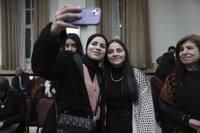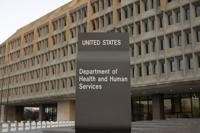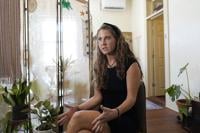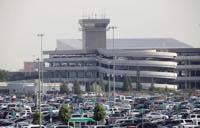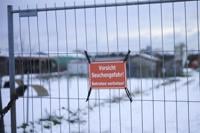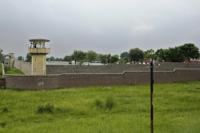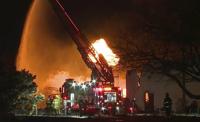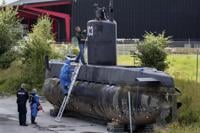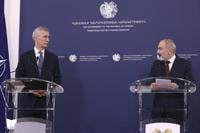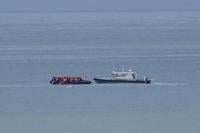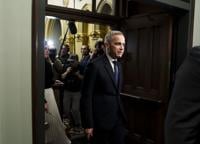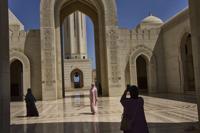RAMALLAH, West Bank (AP) — When Dania Hanatsheh was released from an Israeli jail this week and dropped off by bus into a sea of jubilant Palestinians in Ramallah, it was an uncomfortable déjà vu.
After nearly five months of detention, it was the second time the 22-year-old woman had been freed as part of a deal between Israel and Hamas to pause .
Hanatsheh’s elation at being free again is tinged with sadness about , she said, as well as uncertainty about whether she could be detained in the future — a common feeling in her community.
“Palestinian families are prepared to be arrested at any moment,” said Hanatsheh, one of 90 women and teenagers released by Israel during the first phase of . “You feel helpless like you can’t do anything to protect yourself.”
Nearly 2,000 Palestinian prisoners are to be released as part of a deal to halt the fighting for six weeks, free 33 hostages from Gaza, and increase fuel and aid deliveries to the territory. Many of the prisoners to be released have been detained for infractions such as throwing stones or Molotov cocktails, while others are convicted of killing Israelis.
Hanatsheh was first arrested in November 2023, just weeks into the war triggered by Hamas' deadly attack on Israel. She was freed days later during a weeklong ceasefire in which hundreds of Palestinians were released in exchange for nearly half of the roughly 250 hostages Hamas and others dragged into Gaza.
She was detained again in August, when Israeli troops burst through her door, using an explosive, she said.
On neither occasion was she told why she’d been arrested, she said. A list maintained by Israel's justice ministry says Hanatsheh was detained for “supporting terror,” although she was never charged or given a trial and doesn't belong to any militant group.
Her story resonates across Palestinian society, where nearly every family — in Gaza, the West Bank and east Jerusalem — has a relative who has spent time in an Israeli jail. This has left scars on generations of families, leaving fewer breadwinners and forcing children to grow up without one or both parents for long stretches.
Since the start of the war 15 months ago, the number of Palestinians in Israeli jails has doubled to more than 10,000, a figure that includes detainees from Gaza, and several thousand arrested in the West Bank and east Jerusalem, according to Hamoked, an Israeli legal group.
Many prisoners are never told why they were detained. Israel’s “administrative detention” policy allows it to jail people — as it did with Hanatsheh — based on secret evidence, without publicly charging them or ever holding a trial. Only intelligence officers or judges know the charges, said Amjad Abu Asab, head of the Detainees’ Parents Committee in Jerusalem.
Under the terms of the ceasefire, the Palestinian prisoners released by Israel cannot be later rearrested on the same charges, or returned to jail to finish serving time for past offenses. Prisoners are not required to sign any document upon their release.
The conditions for Palestinian prisoners deteriorated greatly after the war in Gaza began. The country’s then-national security minister, Itamar Ben-Gvir, that prisons will no longer be “summer camps” under his watch.
Several of the prisoners released this week said they lacked adequate food and medical care and that they were forced to sleep in cramped cells.
Men and women prisoners in Israel are routinely beaten and sprayed with pepper gas, and they are deprived of family visits or a change of clothes, said Khalida Jarrar, the most prominent detainee freed.
For years, Jarrar, 62, has been in and out of prison as a leading member of the Popular Front for the Liberation of Palestine, a leftist faction with an armed wing that has carried out attacks on Israelis.
Human Rights Watch has decried Jarrar's repeated arrests — she was last detained late in 2023 — as part of an unjust Israeli crackdown on non-violent political opposition.
At an event in Ramallah to welcome home the newly released prisoners, Jarrar greeted a long line of well- wishers. But not everyone was celebrating. Some families worried the ceasefire wouldn't last long enough for their relatives to be freed.
During the ceasefire's first phase, Israel and Hamas and mediators from Qatar, the U.S. and Egypt will try to agree upon a second phase, in which all remaining hostages in Gaza would be released in exchange for more Palestinian prisoners, a complete Israeli withdrawal from Gaza and a “sustainable calm.” Negotiations on the second phase begin on the sixteenth day of the ceasefire.
For Yassar Saadat, the first release of prisoners was a particularly bittersweet moment. His mother, Abla Abdelrasoul, was freed after being under “administrative detention” since September, according to the justice ministry, which said her crime was “security to the state - other.” But his father — — remains behind bars.
“We don’t know if he’ll be released, but we don’t lose hope,” he said. His father, Ahmad Saadat, is a leader of the Popular Front for the Liberation of Palestine who was convicted of killing an Israeli Cabinet minister in 2001 and has been serving a 30-year sentence.
It’s unclear if he’ll be released and, even if he is, whether he’ll be able to see his family. The ceasefire agreement says all Palestinian prisoners convicted of deadly attacks who are released will be exiled, either to Gaza or abroad, and barred from ever returning to Israel or the West Bank.
The release of some convicted murderers is a sore spot for many Israelis, and particularly those whose relatives were killed.
Micah Avni’s father, Richard Lakin, was by a member of Hamas on a public bus in 2015 and his killer's name is on the list of prisoners to be freed in phase one. While Avni is grateful that more hostages in Gaza are beginning to come home, he doesn’t believe it'll lead to long-term peace between Israel and Hamas.
“These deals come with a huge, huge cost of life and there are going to be many, many, many more people murdered in the future by the people who were released,” he said.
Israel has a history of agreeing to lopsided exchanges. In 2011, Israeli Prime Minister Benjamin Netanyahu agreed to release more than 1,000 Palestinian prisoners in exchange for a single Israeli soldier, Gilad Schalit, taken hostage by Hamas.
One of the prisoners released during that deal was Hamas’ former top leader, , a mastermind of the Oct. 7 attack who was killed by Israeli troops in Gaza last year.
Some Palestinians said the lopsided exchanges of prisoners for hostages is justified by Israel's seemingly arbitrary detention policies. Others said, for now, all they want to focus on is lost time with their families.
Amal Shujaeiah said she spent more than seven months in prison, accused by Israel of partaking in pro-Palestinian events at her university and hosting a podcast that talked about the war in Gaza.
Back home, the 21-year-old beamed as she embraced friends and relatives.
“Today I am among my family and loved ones, indescribable joy ... a moment of freedom that makes you forget the sorrow.”


